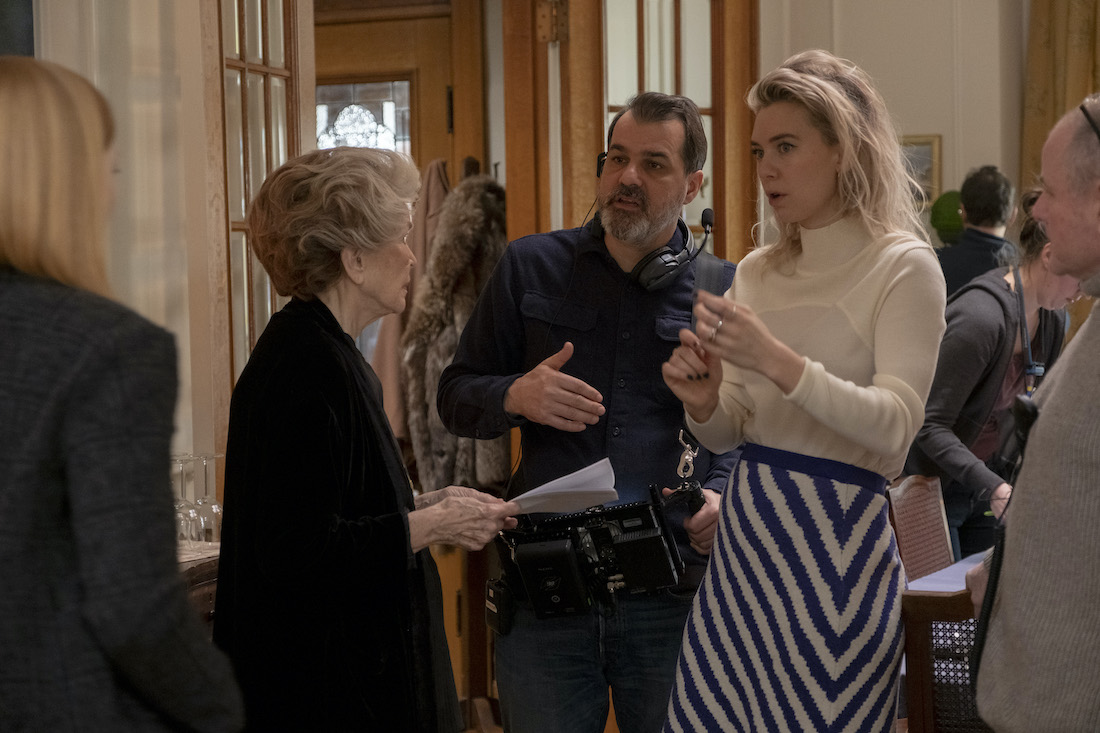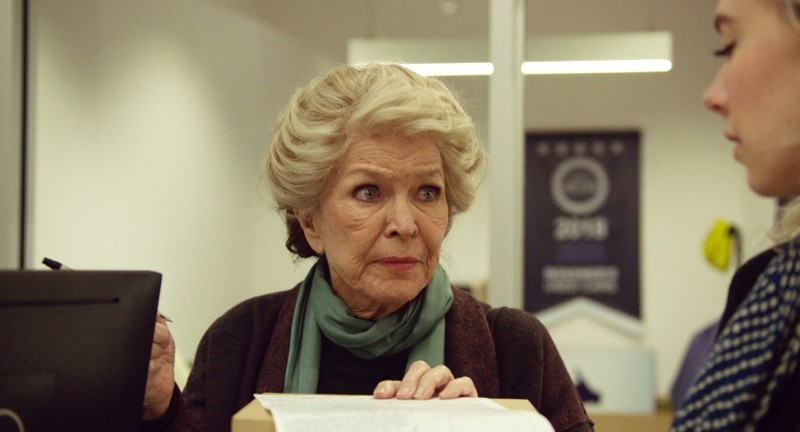
Hungarian director Kornél Mundruczó and writer Kata Wéber adapted their own experience of loss, and the pressure it put on their relationship, into "Pieces of a Woman," the story of a couple who face unspeakable tragedy. Vanessa Kirby plays Martha and Shia LaBeouf plays Sean in the Netflix film, and in an extended, seemingly one-shot scene of wrenching intimacy, we experience with them witness the birth and then the sudden death of their child. In an interview, Mundruczó and Wéber talked about how they spoke to the actors to create that scene, how Martin Scorsese became involved as a producer, and what they learned from making the movie that helped them understand and find some healing what they had gone through.
I want to begin by asking you about the color red, which is very important in the movie. When we first see Martha after her loss, she's wearing a bright red coat. Tell me about the color red in the middle of all those wintery tones.
KORNEL MUNDRUCZÓ: For me, red is something which is really electrolyzing. And if you want to force yourself to be still part of life and society, and also you just want to express that feeling, you really need colors, and so we really go against black color, we go against the real mourning color. So, red is on one hand important for her to energize herself. But at the same time, it's kind of a provocation as well to everyone else and expresses somehow, in a way her happiness. Happiness in that sense that she's still connected to the lost one. And that was the idea and that was really important for me to show with the color red. Because we talked a lot about it because we have a color palette with lots of pale pastel colors all over the movie, except the red which we use just very specific moments.
Like the apple.
KM: Yeah, exactly. And the apple. I am a fan of the Russian avant-garde paintings, like Kandinsky. And when they're using the red it is always very spiritual and very electrolyzing. And that's why I find it that it would be really great to use that color.
A couple can feel that they know each other very well and that they understand each other very well and yet still be surprised that they mourn in different ways, as we see in the film.
KATA WÉBER: Yeah, very much so. I agree on that. These are the moments which define us in many ways, and really in a relationship when you're different. And with togetherness and happy moments, the different things may appear appealing, and it's something that adds to the relationship. But once there is something like a tragedy, the differences may make you question if you can still stay together. And I think Martha's choice to be with Sean in the first place is already a protest. She chooses to be kind of a misfit of the family with a relationship. And then we see if they could survive within these circumstances.

As we see, too, it is natural to look for someone to blame when things go wrong.
KW: Yeah, you're absolutely right. But here Martha feels the legacy of her child must be something good and must be something in the direction of peace and understanding. I did a lot of research and what was so surprising talking to women who lost their babies is that they tend to really not talk about the tragedy and the loss, but about the grace and the light, and the togetherness and the feeling of the biggest love they ever experienced and also understanding what could be the legacy of their child. And therefore, I think it's really important to point out that this is, in the story, quite a heroic act that she does not take revenge. But it comes from the place of loving her baby and wanting the legacy of the baby for good reason. I felt this is someone who could be a real hero.
KM: And also we see the conflict between generations. For Martha's mother Elizabeth, from her past, it was very helpful to find the reason and get revenge. And this kind of thinking just doesn't work for Martha. And especially these days when blaming and revenge is all around. It's crazy, you know? And in that sense such a person like Martha who can change that way of responding, it's pretty heroic.
There are long stretches in the film without a score. And then there are stretches where the music takes over more than the dialogue. So, tell me about those choices.
KM: First of all, we decided that at the beginning we don't really have music, and later on the music is also born somehow as she goes through her process. Music is started to surround the character, and finally we ended up with the form of concerto and that was very important for us. So, we have a solo instrument and we have the orchestra and the solo instruments sometimes piano, sometimes an oboe, sometimes a flute but the orchestra is always separated. I find that very clever because this is also representing somehow the isolation and we have a classical form already to represent that isolation, which is the concerto itself. So, the music became a more and more and more significant element in the movie.
That very intense childbirth scene is unforgettable. What did you say to Vanessa and Shia to prepare them?
KM: Without a good childbirth scene, you have no movie, basically. So, from the point zero that was a very important issue that you have to create something as extraordinary as birth itself, extraordinary for your life even if you are born or if you give birth. So, there is a special film-within-in-a-film kind of entity.
When we started to talk about it, I was clear that I would like to do it as one take. I really wanted to expand somehow film time, just as much as you start to lose your connection to time in intense moments. So basically creating a space where it is more like no time, or really compressed real-time which is like a birth itself.
What I told the actors was that we need all of the chapters, what is inside the birth, the highs and lows through all of the stages. We talked through it with Vanessa and Shia very carefully, especially with Vanessa. I said, "What the audience has to get from the scene is to feel you. Feel you and not understand you, feel you and feel your love to the one who is not here yet, and that's the major thing. So, give me the most physical performance you can and give me the most emotional performance you can." Because that's the ultimate choice, to be connected. In any way as a filmmaker, I really believe your emotional intelligence is above your intellectual intelligence. And if you can activate your emotional intelligence, then the movie is landing on a more honest place. I love the films from Ophüls and Fassbender and was inspired by them. And that's why I needed Vanessa to give an emotional performance. But it really resonated with her as well.

How did Martin Scorsese got involved?
KM: He came through [score composer] Howard Shore. He asked me that, as they worked together quite a few times that I'd be happy if he's sharing the movie with Martin Scorsese. And I was like, "Of course! Don't even ask me! I would appreciate it a lot if he's watching."
And a couple of weeks later Marty Scorsese called me and said that the movie is amazing and "How can I help?" And I was like, "Excuse me, who’s talking?" You know, like crazy. And of course, I was beyond happy. And he used this sentence, which was very important to me: "This is more of an experience than a movie." That's an amazing compliment to me as far as I really would like to give that kind of experience-like feeling from the movie. The team decided that the best help from Martin would be if he became part of the team, and we are very, very proud that he get that and then he spent his time in post-production with us.
The filmmaking must have been very emotional for both of you. Was it cathartic as well? Did you feel that you made progress emotionally in making it?
KW: Yeah, for us, it was kind of like breaking the silence over something that we couldn't really talk about. But it was not obvious from the very first moment. So, we as a couple share an experience of a miscarriage, which is very far from what you see in the movie, but at the same time, we also experienced certain kind of isolation within our relationship. So, I think that's one of the reasons why I didn't want to write about this topic because I felt it would be a very dark place to go where I didn't necessarily want to be. But during the writing process, and then really with the shooting, sharing this thing and this topic with others really somehow helped. And that's also something to understand that once you break the silence over a taboo, you can get new connections, and together with other people you kind of go through a healing process, which you would not necessarily be able to do on your own. So, I think for us that was kind of an experience. I did not realize until the end how helpful it was.
KM: Absolutely. Especially since we had the Netflix premiere. A crazy amount of letters coming. Unbelievable how much mail or Facebook posts from all over the world. And that's very surprising and very encouraging in the same time when you feel like, wow, it's so important for them, but not as a movie, but as an experience. And that's unbelievable power.
"Pieces of a Woman" is now on Netflix. To read Monica Castillo's review of the film, click here.
Nell Minow reviews movies and DVDs each week as The Movie Mom online and on radio stations across the US. She is the author of The Movie Mom's Guide to Family Movies and 101 Must-See Movie Moments.





